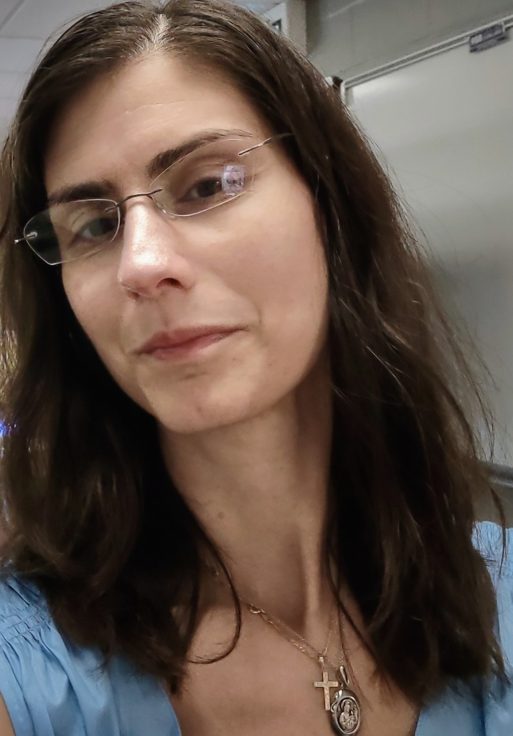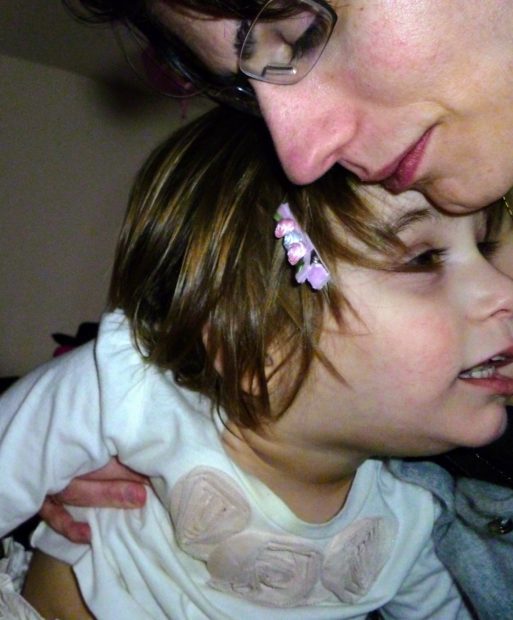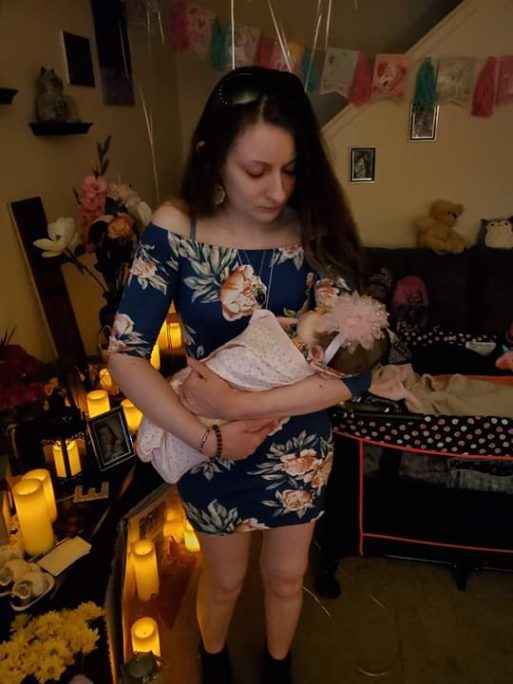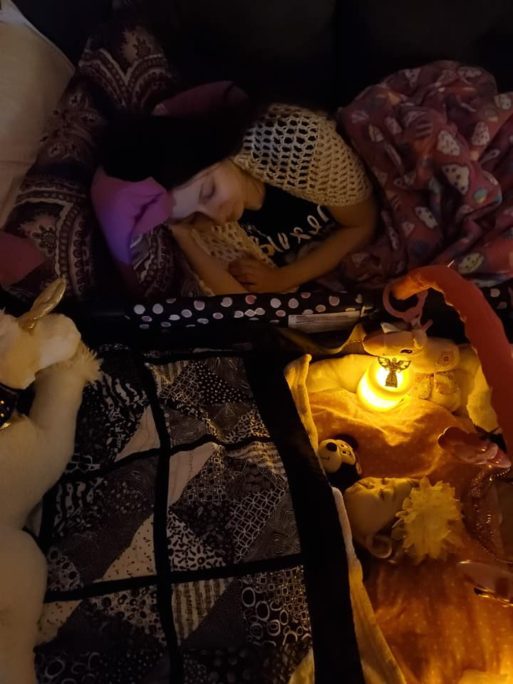
Pediatric death doula Toula Saratsis
Toula Saratsis didn’t seek out becoming a death doula so much as she stumbled upon a calling. After caring for her daughter Angelica through her life-threatening metabolic condition for seven years, Toula had faced the prospect of her daughter dying many times. When Angelica did reach the end of her life, Toula found herself instinctively guiding her child through transitioning from life to death and realized she wanted to help guide other families through the same process.
From there, Toula became a pediatric death doula, specializing in serious illness, end-of-life and after death care. Located in Ann Arbor, Michigan, Toula is passionate about encouraging community death care and making home funerals a possibility if families want to care for their child’s body after death. She brings to her work a deep sense of the sacred, and also a call to advocate for families. SevenPonds had the privilege to sit down with Toula Saratsis to discuss her career and passion for pediatric death care.
Editor’s Note: This interview has been edited for length and clarity.

Toula Saratsis with her daughter Angelica, who inspired her to become a death doula
I’d love to hear about your work as an end-of-life doula and everything that brought you to that.
My path began with my daughter Angelica. At three days old, she had her first metabolic crisis, and it was my first experience with preparing my child for possibly dying. In that moment, I was her doula without even knowing that. It was just a natural instinct to be both her mother and to be concerned with whether she would die well. It was a very spiritual and natural process of wanting to make sure she was taken care of as she faced potential death, starting with getting her baptized before her first procedure — getting a line placed for dialysis. She survived that but Angelica’s condition worsened throughout seven years. She had many crises, many hospitalizations.
Her last stint in the ICU was horrible, but Angelica would let us know that she wanted to keep going. But at some point there were so many setbacks that I knew in my heart that her system was failing. In a team meeting, I said, “I feel like there’s no more to do.” And everyone in the room looked down. People that worked with us for months, who have known her since infancy, wouldn’t look me in the eye. I wish going back that I would have been more assertive and said, “I want to start talking about death care planning right now.” But I felt embarrassed because I thought that it would look like I was giving up on my child. It’s not giving up on your child to acknowledge the reality of what is happening. People don’t want to talk about children dying even when it is a reality, and it was my reality as a parent. It was avoided as a topic by my care team; they were very competent and wanted to connect with us, but that wasn’t the language, protocols, or culture they were used to.
For my child, I knew I wanted to have a home funeral. I am of Greek heritage and seeing people stay in the home was natural to me. I was connected with a home funeral guide, and Angelica went home on hospice. I nursed her through her labor of dying, and I just knew what to do instinctively. I was talking to her about death and connecting with her on it, letting her know that it was okay and just a natural part of our experience. That experience of helping my child cross over without fear…. It was probably the most accomplished I’ve felt as a human being. It was an amazing experience and I knew that other people should feel that way. I felt this work was my calling, and I did a training program to become a death doula.
Within a year after my child died, I had started helping others and was always pulled towards being a pediatric death doula. So now I’m involved as an outside consultant at the hospital; I was already tapped into from my personal experience. The pediatric palliative care social worker will call and say we have a family interested in a home funeral, and I’ll meet with them. I also am available for long distance consultations for families wherever they are, and if I’m not the best resource for a family, I will try to connect them with someone who is. Right now I don’t charge for my services because I really feel like this is my calling and about giving back.
I have worked with adults and the elderly, but there’s something different about the pediatric world and and knowing that there’s so much service that can be done. It’s kind of not fighting against death as unnatural, but embracing that it is a natural process we go through. It feels unnatural at a young age, but even in traumatic situations, it’s a reminder that this is someone’s child and helping the family connect with the body the best that they’re able.

Toula Saratsis companioned the Hoffmann family in caring for their daughter Evey even after death.
Did you ever doubt yourself or question if this work was too intense?
Not so much that. But I do feel the weight of the responsibility, knowing that this work is important and that I feel like I have these gifts and talents for service. There was a period where I had compassion fatigue. I went to Greece for a month to decompress with family. And then it dawned on me that I could walk away from this whenever I want to. This is not for me alone to carry, this is community death care. It is is a collective responsibility. I started to be more exact about my intention and focusing the projects I was working on to specialize in pediatrics.
My faith also grounds me. I am a devout Orthodox Christian, and while I am nonjudgmental about anyone that I serve, this is my personal journey and personal strength. I go to church often to participate in the sacraments. For me, it’s part of the idea of getting out of my own head space and into the heart space that is the human connection. No matter who we are or what we believe or where we’re from, we all have that heart space.
What guides you when thinking about how to guide families through the death of their child?
It’s about final moments. It’s about creating memories. It’s about telling the stories. Sometimes it’s about being able to laugh in the moment. Death is heavy, but it can be about reframing a heavy and sad experience for the families and helping them know they have choices, especially in the clinical setting. The idea is to have it be a natural event, whether that’s in the home or in the hospital. For some families with medically fragile kids, there is no option to bring them home, but families may still want to provide the care of a home funeral.
In the hospital setting, even though it may be an anticipated death, there’s still the shock and families can feel kind of stuck. That’s where I can come in and say, “We can remove the tubing now. You can hold your child.” I encourage families to use oil and lotion, touch the body, care for the body. I act as a stand-in coach to reassure them that they’re doing this right. There is some advocacy that happens in the medical setting, to help families claim their voice. I see my work as helping people to come into their own power that yes, they can care for their child even after death, even in the hospital.
When a family is interested in a home funeral but are at the hospital, it’s about going in and teaching and coaching not just the families but whoever is bearing witness to the situation. A couple of years ago, I served a family whose second child had died from the same complications of a genetic disorder as their first. The family knew they wanted a home funeral, but the child had gotten sick quickly in the pediatric ICU and died as soon as I got on the floor. I invited mom to still prepare the body, but there was a lot of medical things going on beyond my scope. The nurse came in and was confused at first about what we wanted to do, but when she saw how we were treating the child and speaking in soothing tones, letting the child know what part of the body we were going to clean next, the nurse was able to help us with the medical bits and cleaning up the blood. It was the three of us taking care of the child as if she were in her own bed. I provided essential oils, and it just became this very organic, sacred unfolding of rituals. It doesn’t have to be planned. It can unfold into anything that allows people to grieve the way they need to.
I help families know they can advocate for themselves and their child. In a world where things have gotten so medical, there can be fear around even just letting a family wash their child’s body. Death doulas can help give families permission, and in a medical setting, it can calm staff down to know that we are coming in with respect and that we’ve done this before. Sometimes the best thing is to empower the staff or the family to be like, “you already know what to do; you already know how to care.” It is a powerful thing to be able to to support families to find their own voice and to control their own narrative.

Death doulas like Toula Saratsis can help families feel comfortable engaging with the body of their child after death, such as Becca Hoffmann with her daughter Evey.
Is there anything else you want our readers to know?
Anyone in the community can help, it doesn’t have to be necessarily a death doula or home funeral guide. It’s all about the willingness to help and serve. If we’re not available and someone is able to be with the family and help advocate, that is part of community death care. Community death care is about resources and connecting people, connecting networks. We are a profession, but we also have that flexibility of saying that anyone can help.

 A Grieving Mother Finds Her Calling in Supporting Pediatric End-of-Life Care
A Grieving Mother Finds Her Calling in Supporting Pediatric End-of-Life Care


 First the Wealth Gap, Now the U.S. Has a Growing Health Gap
First the Wealth Gap, Now the U.S. Has a Growing Health Gap

 Our Annual Seven Holiday Gifts for Someone Who Is Grieving, 2024 Edition
Our Annual Seven Holiday Gifts for Someone Who Is Grieving, 2024 Edition














